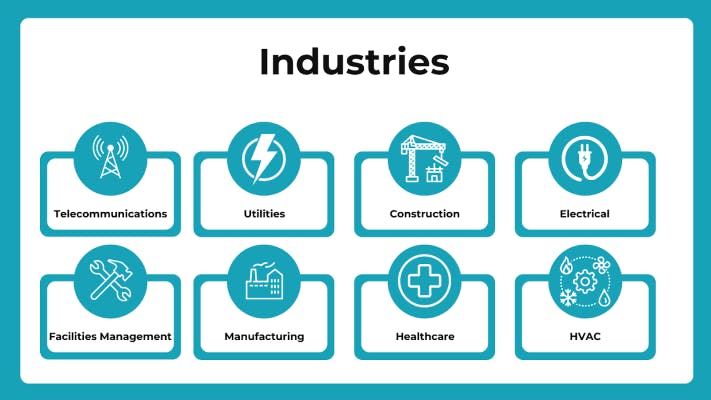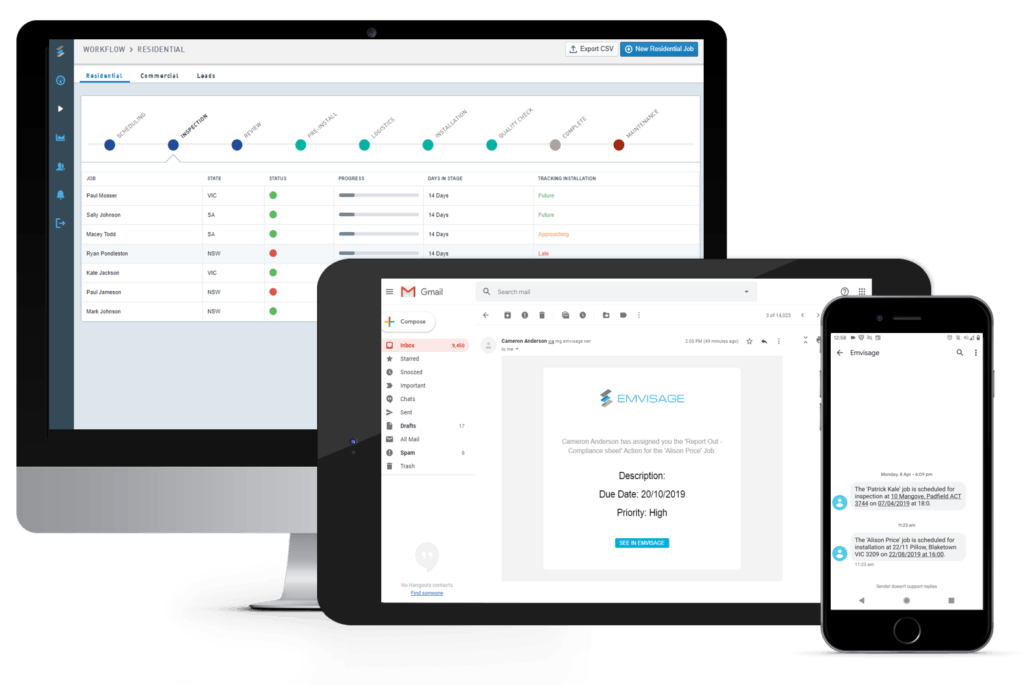Field Service Management - All You Need To Know
May 16, 2024Field Service Software
For Australian businesses with large scale field operations, efficiency and customer satisfaction are not just goals; they are the benchmarks of success.
Field Service Management (FSM) has proven to be transforming field operations from costly logistical pain into streamlined, cost-effective processes.
Whether you're managing your team of colleagues from your HVAC company or overseeing complex field operations for a utilities company, understanding FSM is crucial.
What is Field Service Management (FSM)?
 What is Field Service Management (FSM)?
What is Field Service Management (FSM)?What is Field Service Management (FSM)?
At its core, Field Service Management involves the strategic & centralised coordination of field operations through the use of software systems - in this case a Field Service Management Software.
This includes everything from scheduling and dispatching to managing work orders and ensuring real-time communication between office staff and field agents.
The goal of course, is increased efficiency, productivity, and customer satisfaction.
Examples of some industries that rely heavily on FSM include utilities, telecommunications, electrical, and healthcare.
But why is FSM so vital? For starters, it directly impacts your ability to:
- deliver services efficiently
- meet customer expectations
- scaling business operations without sacrificing quality of service
- and manage resources effectively.
In essence, FSM is about leveraging the right software systems putting the right people, in the right place, at the right time – with all the information they need at their fingertips.
Who is Field Service Management for?
FSM For Various Industries
FSM isn't industry-specific; it's a universal solution tailored to any business that requires close coordination and management of on-site field service delivery with a sizable team of field staff and subcontractors.
There are a few industries in particular that are well-suited to leverage on a FSM technology solution, such as:

Key Benefits of Field Service Management Software
We've mentioned that a technology solution for FSM can be transformative to many industries, but how exactly does it benefit businesses?
- Save Time and Improve Efficiency: Field Service Management Software automates processes and optimises workflows from quotes to completion, reducing downtime and increasing productivity. From cutting mundane admin tasks through automation, this technology solution can mean more time to focus on growth.
- Increase Resource Management and Visibility: Field Service Management Software gives businesses full control over their resources, from scheduling to tracking assets. This leads to better resource allocation and improved asset utilisation.
- Cost savings: By optimising schedules, streamlining workflows and reducing manual processes, Field Service Management Software can result in significant cost savings.
- Enhance Customer Experience and Satisfaction: With real-time communication and ability to estimate timing of work completion, customers clarity on the progress or statuses that concern. Businesses can adapt quickly to changes or emergencies, and provide exceptional service to keep customers informed & happy.
- Ensure Quality and Reduce Mistakes: Field Service Management Software ensures that field staff and/or subcontractors have the right tools, information and guides to provide high-quality service every time. By centralising data, it can reduce human error and eliminate duplication of work.
As technology continues to advance, so does FSM. With the rise of artificial intelligence, machine learning, and predictive analytics, the future looks bright for FSM users.
Some exciting developments on the horizon include:
- Predictive maintenance: Using data and algorithms to predict when assets will require maintenance, results in fewer service disruptions and increased efficiency.
- Augmented reality: Field technicians get access to manuals and documentation through augmented reality glasses, improving troubleshooting accuracy and speed.
- Internet of Things (IoT) integration: Connecting FSM software with sensors and devices in the field provides real-time data for more accurate scheduling and resource management.
- AI Voice-to-Text Technology and Summarisation: Helping field technicians to complete field reports significantly faster and more effectively by eliminating or reducing time spent on report writing.
Features and Common Use Cases of FSM
There are many helpful features and use cases for FSM software depending on a company’s typical workflow.

Some of the most common include:
- Scheduling and dispatching: automating the scheduling process and assigning jobs to field staff and/or subcontractors based on their location, skills, availability, and other factors.
- Work order management: tracking work orders from quotation to completion, including status updates and real-time communication between office staff and field staff.
- Mobile access: enabling field staff and/or subcontractors to access information, update work orders and communicate with the office in real-time through a mobile device.
- Automated field reports: Taking data captured in the field and using it to automatically produce field or job completion reports.
- Communications: Email and SMS notifications to customers, field staff and operations teams. So that everyone is up to date and nothing gets missed.
- Inventory management: tracking inventory levels and locations, ensuring that field staff and/or subcontractors have the necessary equipment and materials for each job.
- Reporting and analytics: providing businesses with insights into key performance indicators such as throughput, SLA performance, job timeframes, customer satisfaction and real time job status.
The Challenges of Field Service Management and How To Improve
FSM, like any business solution, comes with its own set of challenges. Some common ones include:
- Resistance to change from employees used to traditional methods - It’s common for vendors wanting to rush into using the software. Instead, take the time to carefully review your workflow together with key people who do the work. This collaborative approach ensures that the FSM system aligns with actual needs and workflows, and maximises overall efficiency.
- Difficulty in integrating FSM software with existing systems and processes - Research and understand the FSM software's integration capabilities, including API details and options. Involve people from each process area to ensure the FSM system flows seamlessly with existing workflows.
- Training employees on using new technology and processes - Change management and training are important when rolling out any new software, and FSM is no exception. Choose an intuitive FSM that requires minimal training. Field staff should be able to ‘log in and learn’ with short video guides. Focus training sessions on how the software will improve their work and make tasks easier and faster.
To overcome these challenges, it's important for businesses to research and invest in the right Field Service Management Software.
Getting Started with Field Service Management

Assess Your Needs
Take a hard look at your current field service processes. Where are the bottlenecks? What's working, and what isn't? Identifying these areas is your first step toward improvement.
Choosing the Right Software
Not all Field Service Management Software is created equal. Look for solutions that offer scalability, customisation, and seamless integration with your current systems. Doing so will make the transition easier and will mean that you get more out of the software so that it serves your business better.
Implementation Is Key
Once you've chosen your Field Service Management Software, it's all about implementation. This includes training your team, ensuring buy-in from all stakeholders, and continuously monitoring and adjusting as you go.
Conclusion
For medium to large businesses across Australia, Field Service Management Software (FSMS) has become essential.
From time and cost savings to increased growth, the benefits of this tech solution are clear, showing how it transforms field operations.
If you’re looking to improve your business efficiency and customer satisfaction, exploring FSM solutions is a great next step.
Start by considering how Field Service Management can automate and streamline your operations and enhance your service delivery. Explore the options out there and decide on one that best suits your business needs.
